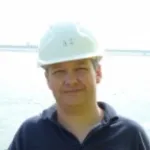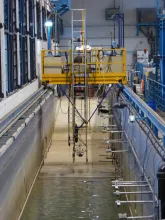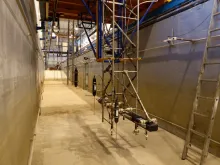NOC’s main contribution to HYDRALAB+ is through the JRA COMPLEX. The main aim of COMPLEX is to expand the capabilities of existing environmental hydraulic facilities of excellence so that they can provide quantified predictions, incorporating the complex, often non-linear, interactions between sediment, water, biota and structures. As part of COMPLEX a study between October 2017 and January 2018 provided the opportunity for a collaborative large scale research experiments between NOC Liverpool, CNRS at the University of Grenoble, and LIM at UPC Barcelona as a contribution to HYDRALAB+.
NOC staff Professor Peter Thorne and Dr Richard Cooke travelled to UPC to join their counter-parts Dr David Hurther from CNRS and Dr Iván Caceres from UPC. The aim of the collaboration is to advance understanding of sediment transport, over rippled beds formed in mixed sediments, under controlled conditions in the wave flume facility at UPC (https://ciemlab.upc.edu/ca). A variety of developmental acoustic instrumentation including the NOC BASSI (Bedform And Suspended Sediment Imager) and the 3D-ARP (Three Dimensional Acoustic Ripple Profiler) are being assessed and used in this study. The outcome is aimed at improving sediment transport flux formulations in complex mixed-sediments to help better predict the impact of climate change in coastal, riverine and estuarine environments.




